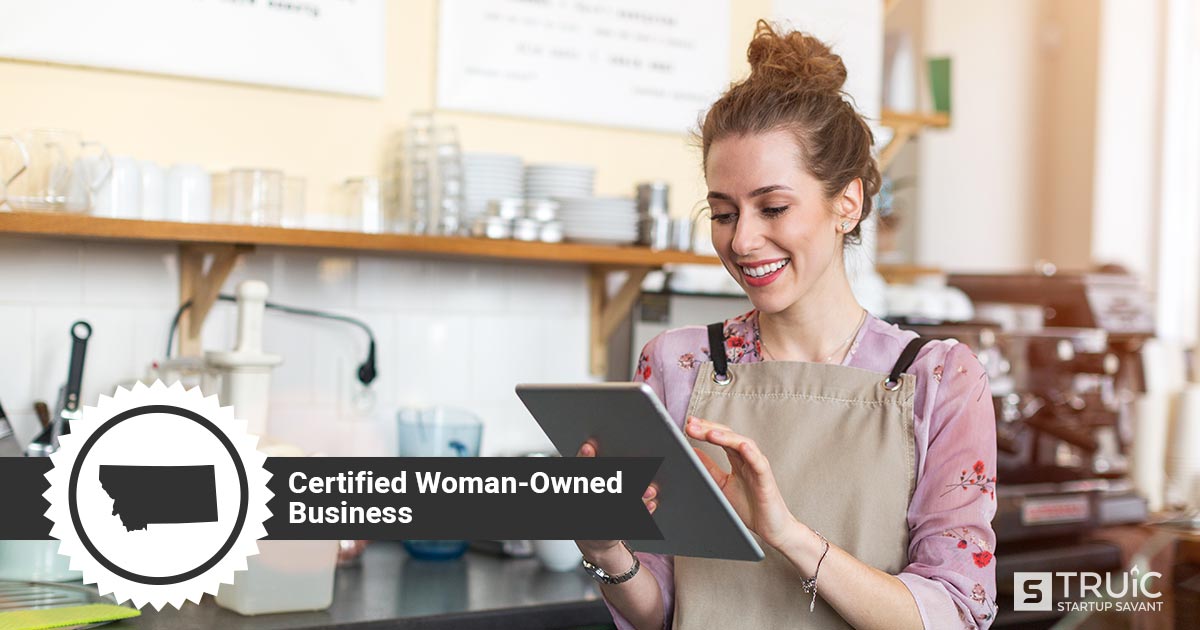Starting your own business in Montana can be both exhilarating and exhausting at the same time. For all the tiny decisions you have to make, it can be overwhelming to figure out the big picture ahead of you. That’s why we’ve done some of the math when it comes to women-owned business certification. You can use this guide to determine whether you want to move forward with an official label for your business or learn more about additional businesswomen resources and other funding opportunities in your state.
Formal recognition from a designated body can be the key to securing lucrative contracts for your company and reliable funding that can allow your business to expand. Learn more about which certifications are available to you, and how you can make them work for your business.
How To Use Our Guide:
We've narrowed down the Women-Owned Business certification process. There are many resources (e.g. WBE or SBA) that will help with your application.
Follow our guide to learn more about how to become a certified Woman-Owned Business in Montana.
What Is a Certified Woman-Owned Business?
A woman-owned business certification is essentially meant to pave the way for additional business for your company. If you apply for certain contracts and projects, you may receive special treatment from decision-makers who are hoping to diversify their partnerships. The federal government famously promised 5% of their contracting dollars to women-owned business, and it’s not the only organization that pledged to diversify.
Certifications may be accepted by private companies, statewide agencies, and municipal groups. If you’ve heard of certifications before, the reference was likely either to the Women-Owned Small Business (WOSB) or the National Women’s Business Enterprise (NWBE). Both certificates are widely accepted in the state of Montana, though each one has their own purposes.
The WOSB was created by the Small Business Administration (SBA), and typically required for any federal opportunities you may choose to apply for. The NWBE may be required for contracts of major corporations or municipal organizations. There’s also the Economically Disadvantaged Women-Owned Small Business (EDWOSB), which is considered a subset of the WOSB.
Some organizations will designate funds specifically by certification. For instance, the federal government may set-aside a certain percentage of dollars specifically for EDWOSBs. Your business is welcome to apply for as many certifications as you qualify for, which may improve your access to a wider breadth of opportunities.
Women-Owned Business Third-Party Certifiers
The SBA can qualify your business as a WOSB, but they’ve also approved other organizations to do the same. You can choose to go through the following organizations:
- National Women Business Owners Corporation (NWBOC): This organization aims to unite millions of women-owned businesses to advocate for the advancement for all.
- Women’s Business Enterprise National Council (WBENC): WBENC promotes diversity whenever possible and helps businesswomen become certified to go further in their careers.
- U.S. Women’s Chamber of Commerce (USWCC): This organization gives women in business the resources and work they need to grow in confidence and leadership.
- El Paso Hispanic Chamber of Commerce: This resource connects, advises, and coaches women business owners. It also advocates for female entrepreneurs and provides Minority Business Enterprise (MBE) and Women’s Business Enterprise (WBE) certifications.
You can also apply for the NWBE certification through these groups as well. Whether you go through the SBA or a third-party, each organization offers its own benefits to women-owned businesses. If you are planning to apply through a third-party, please note that you will still need to notify the SBA so they have all your business’s information on file.
What Are the Qualifications to Become a Certified Woman-Owned Business?
Becoming certified for a WOSB in Montana starts with the following criteria.
- Your company must be considered a small business
- A woman must hold the top position in the company
- Women business owners must control more than half (51%) of the company
- All women owners of the business must be U.S. citizens
If you’re trying for an EDWOSB in Montana, you’ll need to prove that each woman owner of the company meets the following financial parameters:
- 3-year average adjusted gross income must be $350,000 or less
- All assets must be $6 million or less (calculated by fair market value)
- Total net worth must be $750,000 or less
The criteria for all certifications is typically predicated upon the SBA’s rules, though with some variations. If you’re certifying for the NWBE, you may be subjected for an on-site visit where officials will observe the daily operations of the company.
The most important qualification for any certification is that women are running the company and that they have the leadership and technical skills to keep the company afloat. Women owners should be involved in not only the daily decision-making processes, but also making the strategic moves that will determine the future success of the company.
Even if you don’t meet every regulation for certification, you may have some degree of leeway as long as you meet the majority of qualifications. For example, there are several exemptions for the net worth and income on the EDWOSB. If you have questions about your eligibility, you can consult the bylaws for the SBA or request advice through your chosen certifying group.
How Do You Become a Certified Woman-Owned Business in Montana?
Before you start researching the local chapters of the WBENC or NWBOC, we recommend taking the preliminary test through the SBA for the WOSB. The application process can be drawn out, and the fees can be expensive. Taking this test will give you a better idea of what you need to qualify before you waste your resources. If you decide to proceed, the SBA provides a checklist of the documents you'll need so you can better prepare for your application.
Once you’re confident that you want to move forward, you’ll need to decide which designation is right for you. From there, you can decide which certification group you want to go through. You may want to research the requirements of open contracts in your area as well as those that were recently completed. You’ll begin to see a pattern between the opportunities offered and the certifications required for each one.
Some women may even consider changing their business to meet the needs of their local area contracts. For example, changing a private tutoring agency to a public service offering through the library. The right contracts can give you enough funding to hire people with different specialties, which can help you further pivot your business to a more lucrative business model.
When it comes to choosing a certifying group, you’ll want to take stock of as many available parties as possible. Some women find that the SBA doesn’t offer enough women-specific resources, so they prefer to go through an advocacy group like the WBENC. All three third-party certifiers can help you apply for the WOSB or the NWBE, so it helps to become familiar with their operations and values (even if you ultimately decide to certify directly through the SBA).
When it comes to how long each group it will take to certify, you can expect to wait up to 90 days for your approval or denial, though most will aim to give you their decision within a month. Any missing information in your application will either result in a delay while the certifier requests clarification or an outright dismissal. We recommend preparing your paperwork far in advance so everything will go smoothly. If you are denied, the certifying group will typically let you know the reasons why.
Please note that women applying prior to summer of 2020 through the SBA have the option to self-certify through their website; however, after June 30, businesswomen will no longer be able to self-certify. Instead, you will have to certify through an approved third-party agency. Alternatively, you can choose the SBA’s Women-Owned Small Business federal contracting program and apply for certification through their online portal. The SBA application involves two steps:
- Visit sam.gov (the System for Award Management)
- It’s free
- You will have to wait at least 72 hours before step 2
- Visit certify.sba.gov and complete the form
SBA’s online program is free to use, though you will still need to pay the required fees if you’re interested in receiving an actual certificate through a third-party, since the SBA does not provide the certificate itself. A certificate is not required for federal government contracts — you only need to be officially certified and listed on their women-owned business database.
If you’re still unsure about the specifics of the SBA’s Women-Owned Small Business Federal Contracting Program, you can call (800) 827-5722 or email answerdesk@SBA.gov. To speak to a representative, be prepared to wait approximately 5-10 minutes for the automated message to end and depending on their call volume, you may have a longer wait.
Montana Woman-Owned Business Certification Resources
Each state has its own resources when it comes to certifications for women-owned businesses. Going through a state department can help you build relationships locally and ensure you can properly prepare for local opportunities that arise.
Montana Department of Transportation (MDT)
The MDOT offers the Disadvantaged Business Enterprise (DBE) for women-owned businesses who are interested in transportation-related projects. The DBE is available in all states because it’s a federal program, but is granted through the state transportation department. Your company can apply for federally funded projects related to public transit, highways, and aviation. Businesses may also apply if they sell or distribute concessions for the airports.
What Are the Benefits of Becoming a Certified Woman-Owned Business in Montana?
Simply put, a woman-owned certification in Montana can open the doors to more revenue. There’s no firm guarantee that you’ll be chosen, but it can give you a serious edge if you apply for a contract with strong competition.
Your business name will be placed in a directory of other certified businesses, which will be available to all groups who may want to solicit your business for services. So, if you get a WOSB, federal or state agencies will be able to contact you for federally funded projects. Women going for an NWBE may receive interest from corporate or local organizations.
You can also expect a variety of networking and training events when you’re certified. Whether it’s the SBA running an educational seminar about new opportunities for WOSBs or the WBENC holding free social media marketing refreshers, women can use their certification for more than just contract applications.
If you’re hoping for grant opportunities due to your certification, this perk is unfortunately not available. You may qualify for better financing, but state and local groups will not give grants based on certification. There are national grants for women available in Montana though, as well as industry grants that you may be able to apply for based on your business model.
If a woman-owned business certification is not right for you, there are additional funding opportunities such as national grants, investors for women-owned businesses, loans, and more for women entrepreneurs. You can also visit you local Small Business Development Center (SBDC) to learn more about businesswomen resources in your area.
In 2015, Montana had 32,400 women-owned firms in the state, employing tens of thousands of people and generating $4.4 billion in revenue for the state. However, in recent years their numbers have been low in terms of national growth. The right certification can open the doors for women to start increasing their presence in both the state and national economy.



